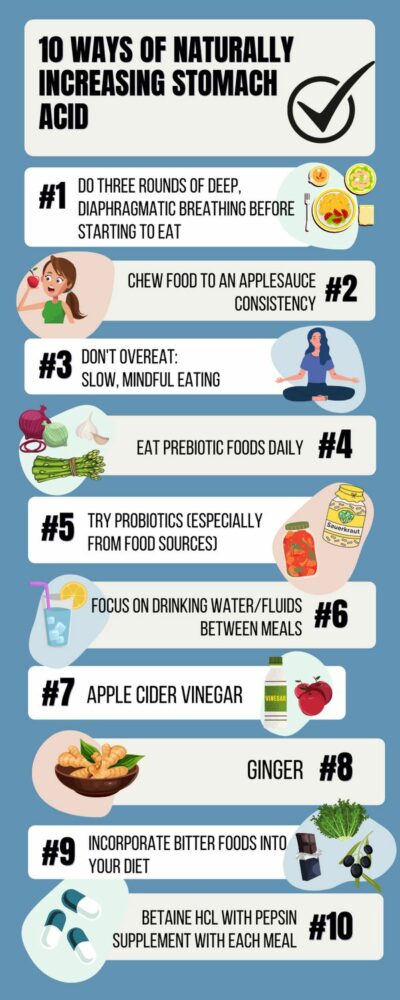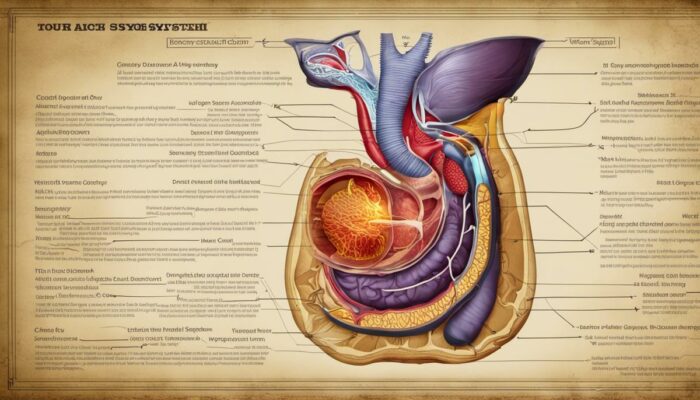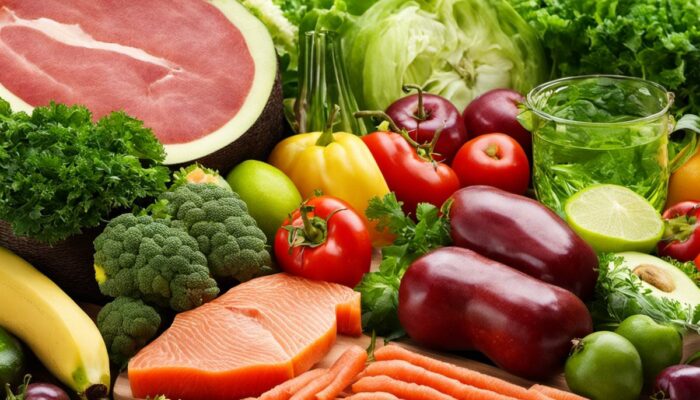Grasping the complexities of our health is an indispensable part of living a wholesome life, and an integral yet overlooked constituent of this overall well-being is understanding the intricacies of our digestive system, particularly the issue of low stomach acid.
Competence in this realm equips us to make informed decisions about our diet and lifestyle choices, directly contributing to improved overall health and vitality.
The consequences of low stomach acid are profound, spanning from impaired digestion to the onset of various associated medical conditions, reinforcing the importance of early detection and effective management. Nutrition plays a pivotal role in regulating stomach acid levels, as it can drastically sway the balance of acidity or alkalinity. So finding the best diet for low stomach acid here is key to resolution.
Additionally, integrating conscientious dietary choices and positive lifestyle changes into daily routines can make a significant difference. But how about this?
What Is Best The Diet for Low Stomach Acid?
Table of Contents
Toggle
Understanding Low Stomach Acid
Low stomach acid, or hypochlorhydria, refers to a condition where the stomach produces insufficient amounts of hydrochloric acid – a pivotal component that ascertains optimal digestion of food in the stomach. Hydrochloric acid also plays a vital role in nutrient absorption and TH1 immune response, which is the body’s first defense against infection.
Therefore, the deficiency of this acid can significantly impact the normal functioning of the body.
Symptoms and Consequences of Low Stomach Acid
People with low stomach acid may experience a range of symptoms that are often overlooked or mistaken for other conditions. These can include bloating, gas, heartburn, indigestion, diarrhea or constipation, flatulence, food allergies, and nutrient deficiencies.
With low stomach acid, our stomach struggles to fully digest food, leading to undigested food getting into the intestinal tract, causing an imbalance in gut flora or gut dysbiosis.
A low stomach acid condition can also negatively impact the digestion and absorption of key nutrients such as protein, vitamin B12, iron, and magnesium, potentially leading to deficiencies despite an otherwise balanced diet.
Causes of Low Stomach Acid
Low stomach acid can result from various factors. Aging ranks amongst the common causes – as naturally, the stomach’s acid production decreases with age. Persistent stress can also impede the secretion of stomach acid. Certain medications, like proton pump inhibitors and H2 blockers, are notorious for reducing stomach acid. Moreover, having a diet high in processed foods and sugars can lead to low stomach acid levels.
Medical Conditions and Low Stomach Acid
Several medical conditions can have low stomach acid as a common denominator. For example, Autoimmune gastritis, a type of chronic stomach inflammation, can lead to lower stomach acid levels. Conditions like H. Pylori bacterial infections can also contribute to low acid levels in the stomach.
Alterations in Diet for Managing Low Stomach Acid
For those struggling with low stomach acid, significant relief can be found by making dietary and lifestyle alterations. A balanced diet packed with vegetables, lean proteins, and beneficial fats can be a beneficial strategy for managing low stomach acid, especially in conjunction with decreasing the consumption of processed foods.
Aiding in promoting balanced gut flora, fermented foods like yogurt, sauerkraut, kimchi, and kombucha can improve digestion. Another method for triggering the production of stomach acid is drinking a mixture of a tablespoon of apple cider vinegar and warm water prior to meals.
Ginger can also be beneficial and be easily incorporated into meals to boost stomach acidity.
Adopting a habit of consuming more frequent but smaller meals and masticating food thoroughly can greatly aid in digestion. Another beneficial practice is mindful eating, which involves eating in a stress-free, calm environment to support better digestion.
Prior to embarking on any dietary program designed to tackle low stomach acid, it’s crucial to consult with a healthcare professional. This will allow for any potential nutrient deficiencies or other health issues to be suitably identified and managed according to the individual’s specific health needs.

The Role of Nutrition in Regulating Stomach Acid Levels
Grasping the Significance of Stomach Acid
Stomach acid, also known as gastric acid, is a digestive fluid that includes hydrochloric acid (HCl). This acid, produced by the cells lining the stomach, is crucial for processing food, absorbing nutrients, and eliminating harmful bacteria.
Under optimal conditions, the food we swallow reaches the stomach where gastric acid begins its breakdown process. Nonetheless, problems can arise when there is an unusually low production of stomach acid, leading to conditions such as hypochlorhydria or achlorhydria.
Common symptoms of low stomach acid encompass heartburn, indigestion, bloating, wind, food allergies, and gastric ulcers, among others. Interestingly, low stomach acid can sometimes even result in conditions like acid reflux or GERD, as inadequately processed food can cause the stomach contents to backflow into the esophagus.
Diet and Stomach Acid Levels
There is a profound correlation between the foods we consume and our stomach acidity levels. Both acid-forming and alkaline-forming foods can have a marked impact on gastric acid.
Acid-forming foods are those such as processed foods, meats, grains, and sugar, which contribute to increased acidity in the stomach. Conversely, alkaline-forming foods would include most fruits, nuts, legumes, and vegetables, which can help to reduce acidity.
Regarding stomach acid levels, these foods neither reduce nor increase stomach acid directly.
Nevertheless, they influence the pH balance of the urine, meaning what is expelled from the body is impacted by the food types consumed, which can consequently affect the body’s overall pH levels, including the stomach.
Food Intake and Hypochlorhydria
A poorly balanced diet, high in acid-forming foods, can exacerbate low stomach acid symptoms by further increasing the acidity of the stomach. To counteract this, individuals with low stomach acid are often directed to increase their intake of alkaline or base-forming foods, which facilitate a more stable pH level within the body. These include;
- green leafy vegetables,
- root vegetables (especially beetroot), and
- food rich in probiotics; such as yogurt and sauerkraut.
Omega-3 fatty acids (commonly found in fish and flax seeds), lemons, and apple cider vinegar are also reported to be beneficial for those trying to manage their stomach acid levels.
Moreover, adequate hydration is essential, but it is advised to drink water outside of meal times. Drinking large amounts during meals can dilute stomach acid and hinder the digestive process.
It is important to remember, that understanding your individual dietary needs and tailoring your diet in response to these is key. Consistency and patience are crucial, as marked improvements may take some time to appear.
Why It’s Crucial to Seek Professional Advice
If you’re struggling with symptoms that might indicate decreased stomach acid levels, it’s crucial to consult with a healthcare professional. A dysregulated stomach acid level can often be a sign of more severe underlying health problems.
These professionals can offer a thorough assessment and recommend the most suitable diet changes or treatments to properly manage your condition.
However, while the correct diet can be advantageous in regulating stomach acid levels, it’s equally vital to assess lifestyle habits, levels of stress, and medication usage.
Such factors can notably influence the capacity of your stomach to produce acid. Modifying habits in these areas can significantly aid in symptom management and potentially enhance general wellness.

Food Items to Include in a Low Stomach Acid Diet
Dietary Options for Low Stomach Acid
Gastric acid, also known as stomach acid, is a key player in our digestive process. A reduction in stomach acid can complicate digestion, potentially leading to symptoms like bloating, heartburn, and constipation.
The good news is that by incorporating specific foods into your diet, you can help boost the production of this crucial acid, thereby improving digestion and holistic health.
Protein-Rich Foods
Protein stimulates gastrin production, a hormone that promotes the production of stomach acid. Incorporating protein-rich foods such as lean meat, poultry, fish, legumes, eggs, and dairy products can therefore have a beneficial effect on low stomach acid.
Zinc-rich Foods
Zinc is necessary for the production of stomach acid. Food items high in zinc include red meat, shellfish, legumes, seeds, nuts, dairy products, eggs, and whole grains.
Vegetables
Vegetables, particularly leafy greens, are low in sugar and rich in digestive enzymes, thus they are excellent for boosting stomach acid levels while also aiding digestion.
Fermented Foods
Fermented foods are loaded with beneficial enzymes and bacteria that assist in digestion. This includes items like sourdough bread, kimchi, sauerkraut, yogurt, kefir, and pickled vegetables.
Apple Cider Vinegar
Consumed before meals, apple cider vinegar has been shown to increase stomach acid, improving digestion and nutrient absorption.
Ginger
Ginger has been widely recognized to stimulate digestive juices including stomach acid, promoting the process of digestion. It also helps to soothe the digestive system.
Citrus Fruits
Oranges, lemons, grapefruits, and similar citrus fruits are known to increase stomach acid, thus aiding digestion.
Pineapple
Pineapple contains the enzyme bromelain, which helps in breaking down proteins, thus aiding digestion and potentially boosting stomach acid levels.
Sea Salt
Sea salt naturally contains chloride, which is needed to produce hydrochloric acid in the stomach. Adding sea salt instead of conventional table salt to dishes could have a beneficial effect on stomach acid levels.
Integrating specific foods into your daily dietary regimen can be beneficial in boosting your stomach acid levels. Take note of your body’s particular reactions to each food product, and adjust your diet as per the observations.
As it’s often immensely beneficial to receive professional advice, consider consulting a dietitian or healthcare expert if you encounter ongoing digestive complications. They may suggest a progressive integration of these foods into your diet or recommend alternative dietary adjustments.

Foods to Avoid When Dealing with Low Stomach Acid
Foods Known to Cause Reduction in Stomach Acid Levels
It’s crucial to recognize that certain food products have been identified to cause a reduction in stomach acid levels. Therefore, individuals dealing with low stomach acid issues should restrict consumption of these items. These can include:
- Hot and Spicy Foods: A substance called Capsaicin found in hot peppers has a detrimental effect on stomach acid levels by inhibiting their secretion. As a result, consuming hot foods could potentially exacerbate conditions of low stomach acid. Foods containing chilies, jalapeños, habaneros, or other hot pepper varieties should be eaten sparingly.
- High Sugar Foods and Beverages: Sugary food products and beverages are notorious for their potential to inhibit stomach acid levels. An overgrowth of harmful bacteria in the gut caused by sugar can result in a decrease in stomach acid production. So It is strongly encouraged to limit the consumption of food and drinks with a high sugar content, such as pastries, sweets, fizzy drinks, and ready-made meals.
Foods That Trigger Symptoms of Low Stomach Acid
Preventing the symptoms of low stomach acid is an integral part of managing this condition. Some food items are notorious for triggering symptoms such as heartburn, bloating, gas, and abdominal discomfort.
They include:
- Acidic Foods: While it might seem counterintuitive, overly acidic foods can produce a reaction in your stomach and may provoke symptoms. These include citrus fruits, tomatoes, and vinegar.
- Alcohol and Caffeine: These can stir up stomach acid production and subsequently trigger heartburn and indigestion. Avoiding or limiting intake of these beverages can help reduce symptoms associated with low stomach acid.
- Fatty Foods: Foods high in fats, particularly saturated fats, can slow the stomach emptying process. This can increase the risk of reflux and discomfort. Such foods include fast food, fried food, fatty meats, and full-fat dairy products.
Other Factors to Consider
Factors such as smoking and stress can be detrimental to stomach acid levels. These have been shown to exacerbate the prevalence and severity of low stomach acid symptoms. Therefore, alongside diet, those afflicted with this issue should contemplate giving up smoking, lessening alcohol intake, managing stress, and integrating regular physical activity into their regimen.
Opting for less acidic foods, eating smaller meals more frequently, and maintaining a healthy weight can alleviate the symptoms of low stomach acid. Always seek the advice of a healthcare professional for personalized dietary advice adjusted to your individual needs and underlying conditions.

Lifestyle Modifications and Recommendations
Dietary Modifications for Low Stomach Acid
A good starting point would be making gradual changes to your diet that can potentially aid in increasing stomach acid levels. It is commonly suggested to include in your diet foods that naturally stimulate gastric acid secretion. This might encompass high-protein foods, green leafy vegetables, and bacteria-fermented products like yogurt and kombucha.
Adding Apple Cider Vinegar to your diet may also be beneficial, either by directly consuming a small amount mixed with water before meals or by introducing it into salad dressings. You can also try ACV supplements.
The Impact of Stress on Stomach Acid Production
Interestingly, your physical health and mental well-being are deeply interconnected, and your stress levels can significantly impact the functioning of your digestive system. Chronic stress can inhibit the production of stomach acid, as the body redirects its resources to deal with the perceived threat.
Therefore, managing stress effectively is a critical part of dealing with low stomach acid. Techniques such as mindfulness, yoga, meditation, and deep-breathing exercises have proven quite effective in reducing stress levels.
The Importance of Adequate Sleep
Sleep is when the body effectively rests, heals, and regenerates – and this includes the digestive system. Adequate, quality sleep helps rejuvenate the body’s digestive function, hence promoting optimal stomach acid secretion.
Therefore, aiming for at least seven hours of uninterrupted sleep each night is a good rule of thumb.
*Note: if you need help with getting a good night’s sleep check out our page HERE<<
Exercise and Stomach Acid Production
Regular physical activity is another lifestyle modification that supports healthy digestive functioning. Moderate-intensity exercise, such as walking, cycling, or swimming, can help stimulate the digestive tract, including the stomach’s acid-producing cells.
Just remember, the trick is consistency, not intensity.
Regular Health Check-ups
Routine health check-ups are important as persistent low stomach acid can sometimes be a symptom of a more severe underlying condition. Regular check-ups ensure that if there is something else going on, it is detected and treated early.
Sustaining Lifestyle Changes
Finally, while knowing what changes to make is essential, sustaining these lifestyle modifications is the real challenge. It’s key to make realistic, incremental changes rather than implementing too many changes at once. For example, start by adding a few stomach acid-friendly foods to your diet before gradually increasing the variety and portion size.
As with any lifestyle modification, patience and persistence are key to realizing lasting benefits.

In Conclusion
Coalescing an understanding of low stomach acid with proactive lifestyle modifications can pave the way toward enhanced health and well-being. By carefully curating the diet, prioritizing acid-boosting foods, and eliminating those that prompt acidity reduction, it becomes feasible to manage stomach acid levels adeptly.
Furthermore, simple lifestyle modifications like stress management, ensuring adequate sleep, engaging in regular exercise, and scheduling regular health check-ups can yield immense dividends in the management of this issue. It is essential to remember that, fundamentally, your health is in your hands.
Being attentive to the signs your body gives you and responding appropriately and timeously is paramount to holistically ensuring a greater state of health.
I shall conclude the article here but if you would like to read more check out our page HERE<<






Anxiety and Depression BiOptimizers blood pressure supplements blood sugar control blood sugar support supplements cognitive function digestive enzymes Digestive Enzymes Supplement Digestive Health digital products Dr Sam Robbins Exercise Gut Health Gut Health While Travelling Health Tips for Travelling Healthy Living heart health HFL How To Lower Cholesterol insulin resistance joint health supplement keto dieting Keto Diet Weight Loss leaky gut supplements list Magnesium deficiency Matt Gallant mental health multivitamins Nootopia Nootropics nutrient supplements Probiotics Probiotic Supplements reverse type 2 diabetes stress and anxiety stress relief vitabalance vitapost Wade Lightheart weight loss articles weight loss diet plans weight loss product reviews weight loss supplements weight loss tea





